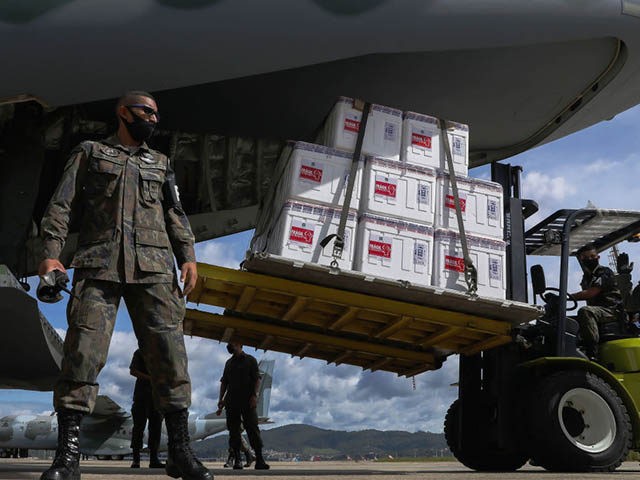Chinese dictator Xi Jinping announced Thursday that the Communist Party will “strive to provide” the world access to 2 billion Chinese-made coronavirus vaccine doses, particularly targeting vulnerable countries.
Xi has repeatedly referred to Chinese-made vaccines as a “global public good” that Beijing would offer the world, especially allies in poorer countries with limited access to higher-quality vaccines made in the free world. Xi does not use explicit language that Beijing would distribute these products for free but appears to imply that this is the case despite the fact that China has not done so, floating predatory loans to developing countries to buy the vaccines.
China’s two most widely distributed vaccines, from the firms Sinovac and Sinopharm, have tested as some of the least effective vaccines against coronavirus infections available around the world. Sinovac’s “Coronavac” has been particularly problematic for nations depending on it, as it has tested at only 50.38 percent effective at preventing infections. Vaccines generally need to pass a 50-percent efficacy threshold to be considered functional. Sinovac has responded to concerns about low efficacy by urging people to get a third “booster” shot of their product, which the World Health Organization (W.H.O.) discouraged this week.
The Chinese Communist Party has refused to state publicly if Xi himself has received a Chinese-made — or any — vaccine against the Chinese coronavirus, despite the fact that dozens of world leaders have televised or otherwise publicly documented their use of Chinese-made vaccines.
“China is committed to building a global community of health for all and has provided vaccines to the world, especially developing countries,” the Chinese state news agency Xinhua quoted Xi as saying Thursday. “The country actively carried out joint production, which illustrates the concept of vaccines as global public goods.”
In addition to the 2 billion vaccine candidate doses, Xi also announced a $100 million donation to Covax, the W.H.O.’s vaccine distribution system for underdeveloped countries.
“I hope this forum will promote the accessibility and fair distribution of vaccines around the world, strengthen solidarity and cooperation in developing countries, and make new contributions for an early victory against the pandemic,” Xi reportedly added.
Xinhua again referred to Chinese vaccines as a “global public good” in its coverage, without clarifying if Xi meant the vaccines would be reserved for sale to foreign countries or actually donated to poor governments that would otherwise be unable to buy them. It noted that China is already selling vaccine candidate doses to over 60 countries.
China initally announced a significant increase in vaccine manufacturing in April, for the express purpose of selling doses to poorer countries. Some of the countries around the world with the highest percentage of vaccinated populations have relied on Sinovac and Sinopharm, only to later document an increase in coronavirus infections and deaths. Seychelles, an African island nation once considered the world’s most vaccinated, was among the first to document such a post-vaccination infection increase, which occurred prior to global panic over the Indian “delta” variant of the virus. The Seychelles government, a Beijing ally, defended the vaccines following the spike.
Chile, Latin America’s most vaccinated nation, experienced a similar increase in cases after relying on Chinese-made vaccines. Mongolia, Thailand, and the United Arab Emirates also documented similar increases. As a result, some other nations, like Singapore, have implemented policies that do not recognize those receiving Chinese-made vaccines as vaccinated against the Chinese coronavirus.
In April, Gao Fu, the head of China’s Center for Disease Control (CDC), publicly stated Chinese-made vaccines “don’t have very high protection rates” in remarks urging Chinese companies to pursue the development of mRNA technology vaccines like those available in America. He later claimed his remark was taken out of context.
Last month, Gao claimed that he had taken doses of three different Chinese-made coronavirus vaccines, fueling national distrust in the products despite his argument in making the claim was that the vaccines are safe, as he had allegedly not suffered any adverse health effects.
China is currently experiencing its largest and most devastating coronavirus outbreak since the novel coronavirus first began infecting people there in 2019. All 31 provinces in the country have issued warnings discouraging internal travel to limit the spread of the virus. Wuhan, the city where the virus originated, has returned to lockdown measures, prompting residents to hoard food, eschew public transit, and refuse to leave their homes.
China claims to have administered about 1.7 billion doses of Chinese-made vaccines nationwide, most of which require two doses. According to Reuters, this represents 62.3 percent of the population, a rate insufficient to prevent community spread. China’s most prominent infectious disease expert, Zhong Nanshan, has warned on several occasions this year that vaccination rates in China are too low and may result in the development of a new variant or a situation in which China lags behind other developed nations in attaining herd immunity.
Xi Jinping has not participated in a single event or made any attempt to encourage Chinese nationals to get vaccinated. The Chinese Communist Party refuses to disclose if Xi himself is vaccinated, fueling speculation of distrust at the highest levels of government in these products. As a senior citizen, Xi is in a category of vulnerable persons for severe coronavirus infection.

COMMENTS
Please let us know if you're having issues with commenting.